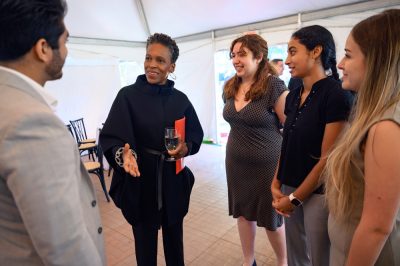By Lindsay Shachnow and Sydney Topf
Students took part in the selection process of Boston University’s 11th president, Melissa Gilliam, alongside the Presidential Search Committee and the Board of Trustees.

Members of the student government had the opportunity to speak with the presidential candidates and relay their feedback about the candidacy to the search committee. Undergraduates were also able to participate in listening sessions last Fall.
“Something that myself and the other students on the search committee immediately noticed was how empathetic and student-centered her priorities were,” Student Body President Dhruv Kapadia, a senior in the College of Arts and Sciences, said of Gilliam. “We were rooting for her.”
Dean of Students Jason Campbell-Foster wrote in an email that “students were selected to meet with the finalists and provide feedback to the search committee.”
At Gilliam’s announcement ceremony, BU Board of Trustees Chair Ahmass Fakahany thanked students for their “feedback” and “candor” about student involvement in the search.
“You grounded us and always reminded us we’re actually here for you, those students before you and those who will follow you,” he said.
BU spokesperson Colin Riley said this was not the first time students were involved in the selection process — there were student members on the search committee that led to former President John Silber’s appointment.
The members of student government were not involved in the initial search, they just met with the final slate of candidates, Kapadia said.
Senate Chair Hanna Dworkin, a senior in CAS, said student government wrote an open letter to the search committee last spring calling for student involvement on the committee.
Roughly a month later, the search committee invited members of the student government to interview candidates over the course of last semester and into the summer. Dworkin said she felt that the Chair of the Presidential Search Committee and the Chair of the Board of Trustees listened to student input.
“They were really more than receptive and I felt that our opinion really played a big role in this decision,” Dworkin said.
Kapadia said they met Gilliam months ago and spoke with her about the priorities and ongoing issues that students are facing.
“One priority that I brought to every interview was how the candidate would view BU as an institution,” he said. “I think more often than not we see past leadership at BU treat our institution as a corporation rather than a place of higher education and so I made sure to try and gauge a candidate’s opinions on that specific question.”
Gilliam’s answer, Kapadia said, was “by far the best” because she cared deeply about making BU an institution that is “centered around students rather than profit.”
Ilana Keusch, a senior in CAS, said Gilliam seemed “smart” and “personable” during her interview as a potential candidate.
“She obviously cared a lot about academic institutions and the students that contributed to them,” said Keusch, who is Chief Justice of student government. “She’s very invested in her research and just in knowledge in general, and I think that’s very important.”
Keusch said multiple members of the search committee assured the students that their feedback was taken into consideration.
The listening sessions, open to all undergraduates, invited students to share their thoughts about the qualities and experience the search committee should look for in a presidential candidate.
Although she only sat in on a few of the sessions, Navya Kotturu, a senior in CAS and Sargent College of Health and Rehabilitation Sciences, said she felt heard by the search committee.
“I would like to think that based off of our feedback and based off of the general consensus that we’re very happy with who they chose, that they did listen to what we had to say and really prioritize those things,” Kotturu, who is student government executive vice president, said.
Still, Kapadia said students’ involvement in the search was “very limited.” While he was glad that student government leaders were able to speak with candidates, Kapadia said he wished other student leaders could have also been included.
“I think the absence of a fully standing student committee member on the actual search committee was telling. I think, in that regard, BU did fail,” he said. “I really do think students should have been put more at the center of this process.”
Stella Tannenbaum contributed to the reporting of this article. Ilana Keusch wrote for The Daily Free Press in 2021. She was not involved in the writing or editing of this article.






















































































































